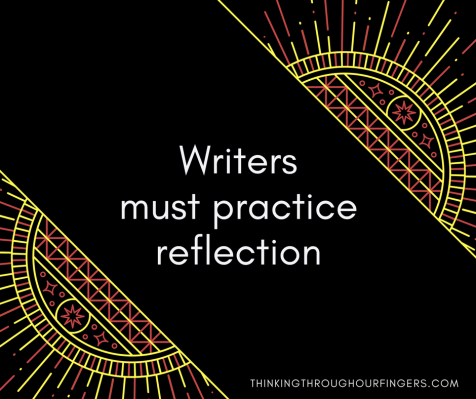This week, as part of my day job, I’m attending a conference “dedicated to educating leaders in higher education, K-12, and non-profit organizations on experiential and project-based learning”. The principles discussed here fit in with the model established by David Kolb. There is lots of information about the Kolb cycle online, but one of the key factors that I think should be woven regularly into the process of writing is that of reflection.

The idea of reflection is not new. If you are like me, you may do this often after a situation has gone wrong. In those situations, you may think “I could have…” or “I should have…” or even “If I hadn’t…”. It may even be accompanied by a feeling of regret or the longing to take something back. But as a writing tool, reflection is invaluable.

I think there are two kinds of reflection: accidental and intentional. Accidental reflection comes when you are reading through a craft book, listening to a presentation about character development or world-building where many of the things that are shared are reminders instead of new lessons. It might be when there is a Q&A and as you are listening to the questions being asked, you will realize that you know the answer, or at least a way to answer. It’s like what my own children are experiencing on a semi-regular basis lately where they are being asked to stand up or next to someone and realize they have grown.
Accidental reflection is an exceptional way to know how far you’ve come. It is a reason to celebrate knowledge and understanding and better appreciation of craft. But it isn’t the kind of reflection that allows you, as an artist, a weaver of words, a composer of character, to grow.
When we engage in intentional reflection, we are seeking out a way to learn and to improve. We are looking at our stories, our characters, our emotional impact, our setting and deliberately considering what is working, what isn’t working, why it is or isn’t. Intentional reflection means we know what we did to make these things work; it means we are searching and studying and reaching for an understanding of why something isn’t working.
The way this infiltrates our writing could be varied depending on our writing methods. As an outliner, I try to think through the complications and be intentional during my drafting process while I know many people who are pantsers or people who revise as they draft who prefer to weave or layer the details in as they become aware of them. Intentional reflection requires analysis of not only our stories, but of those that have an impact on us, whether that be movies, TV shows, books or plays.
If we desire to continue to improve as a writer, intentional reflection is a fundamental key to that success.
_________________________________________
 Tasha Seegmiller is a mom to three kids and coordinator of the project-based learning center (EDGE) at Southern Utah University. She writes contemporary women’s fiction with a hint of magic, and thrives on Diet Coke, chocolate and cinnamon bears. She is a co-founder and the managing editor for the Thinking Through Our Fingers blog as well as a board member for the Women’s Fiction Writers Association. Tasha is represented by Annelise Robey of the Jane Rotrosen Agency.
Tasha Seegmiller is a mom to three kids and coordinator of the project-based learning center (EDGE) at Southern Utah University. She writes contemporary women’s fiction with a hint of magic, and thrives on Diet Coke, chocolate and cinnamon bears. She is a co-founder and the managing editor for the Thinking Through Our Fingers blog as well as a board member for the Women’s Fiction Writers Association. Tasha is represented by Annelise Robey of the Jane Rotrosen Agency.

Pingback: Tell The Story | Thinking Through Our Fingers
Pingback: Dear Writer: Keep Learning | Thinking Through Our Fingers